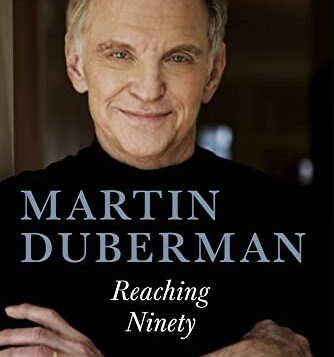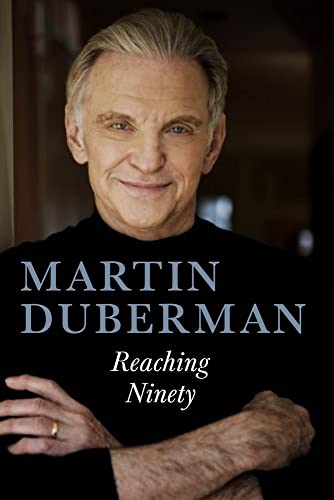MARTIN DUBERMAN has been an important public intellectual and a major figure in the LGBT movement for many decades. As an openly gay historian, biographer, playwright, activist, organizer, and essayist, he was the founder and first director of clags, the Center for Lesbian and Gay Studies at CUNY, and has been a major force for the advancement of LGBT scholarship.
He has also produced a series of memoirs. The latest, Reaching Ninety, is a summing up of a long and remarkable life as he reaches his ninetieth birthday. In it, he covers some familiar ground—coming out at a time when it was exceedingly difficult to do so (he was born in 1930), his experiences in psychotherapy—but more than in previous memoirs, he’s willing to speak out about matters that he was reluctant to speak of before. At ninety, one imagines, he doesn’t really care if he offends anyone or if someone disapproves.
He discusses what it’s like to grow old and struggle with the inevitable health crises—in his case, involving his heart. Aging as a gay man is a topic that’s not often addressed head-on, and it’s refreshing to find someone willing to do so. Duberman admits that he sometimes finds it difficult to concentrate on his work. He struggles to fit into a community in which youth and beauty are the coin of the realm.
The personal story he tells is both touching and instructive, but Duberman goes beyond the autobiographical in this book and addresses the institutional settings with which he interacted. Two things stand out. First is the degree to which homophobia persisted in academia well into the 1980s and 1990s and beyond, even in New York City, and even in the relatively rarified intellectual circles in which he traveled. Second is the story of how difficult it was to establish clags and the many obstacles he encountered, and the ongoing challenge of keeping it relevant to all segments of the community.
Early on it had seemed that the best possibility for a gay studies center was at Yale, Duberman’s alma mater, and he writes with brutal honesty about the resistance he met from the Yale administration and from John Boswell (1947–1994), the eminent gay historian on the Yale faculty. In the end, the center landed in New York, and it was the first serious institutional center for queer studies in the U.S.—a major breakthrough for LGBT studies as a valid scholarly pursuit. The snobbery and biases Duberman encountered at Yale are part of the story, as is the paltry financial support he initially received for clags from the powers that be at CUNY. Much later, a provost at CUNY would describe clags to me as his institution’s crown jewel, but Duberman makes clear that the administration at first wanted to acquire this jewel at bargain basement prices.
There is some score-settling in this part of the narrative, along with a dollop of kvetching, but mostly Duberman tells his story straightforwardly. It is, of course, his story, and others may contradict him on various points, including his description of the infighting on the clags board. Such is the nature of a memoir: it is one individual’s story, one point of view.
But, of course, it’s an amazing story by someone whose point of view is informed by firsthand participation in the unfolding of LGBT history from life before Stonewall through the era of Gay Liberation and, in turn, that of the AIDS crisis. This brave and searingly honest memoir is both a personal story and a vital institutional history of the LGBT struggle to date. ____________________________________________________
H. N. Hirsch, emeritus professor of politics at Oberlin College, is the author of the novel Fault Line and the memoir Office Hours.






